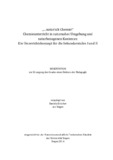Citation link:
https://nbn-resolving.org/urn:nbn:de:hbz:467-9277Files in This Item:
| File | Description | Size | Format | |
|---|---|---|---|---|
| Dissertation_Daniela_Elisabeth_Krischer.pdf | 7.15 MB | Adobe PDF |  View/Open |
| Dokument Type: | Doctoral Thesis | metadata.dc.title: | „…natürlich Chemie!“ : Chemieunterricht in naturnaher Umgebung und naturbezogenen Kontexten ; ein Unterrichtskonzept für die Sekundarstufen I und II | Other Titles: | "...natürlich Chemie!" : chemistry class in near-natural environments and nature-related contexts ; a teaching concept for the lower and upper secondary | Authors: | Krischer, Daniela Elisabeth | Institute: | Fakultät IV - Naturwissenschaftlich-Technische Fakultät | Free keywords: | Unterrichtskonzept, Naturbezug, Chemistry - Study and teaching, teaching concept, Sustainable development | Dewey Decimal Classification: | 540 Chemie | GHBS-Clases: | UWS UXA UXC UYK UZS |
Issue Date: | 2014 | Publish Date: | 2015 | Abstract: | Obwohl viele natürliche Phänomene auf chemischen Prozessen beruhen, herrscht in weiten Teilen der Bevölkerung eine antagonistische Sicht auf Chemie und Natur vor: Chemie wird ablehnend betrachtet und zumeist mit Industrie und Technik assoziiert; Natur ist dagegen äußerst positiv besetzt und wird häufig idealisiert und romantisiert. Eine Verbindung beider Konzepte wird kaum wahrgenommen. Diese Tendenzen werden einerseits in der Literatur vielfach beschrieben und konnten andererseits im Rahmen einer im Frühjahr 2013 durchgeführten Erhebung an Schulen im Raum Siegen und Olpe belegt werden. Eine solche antagonistische Vorstellung ist aus wissenschaftlicher und didaktischer Sicht nicht weittragend, stellt Chemie schlussendlich nur eine mögliche Sicht auf Welt und somit auch auf Natur dar. Eine stärkere kognitive und emotionale Verknüpfung von Chemie und Natur könnte hier einen vielversprechenden Interventionsansatz des Chemieunterrichts darstellen. Das Unterrichtskonzept „…natürlich Chemie!“ stellt einen praktisch umsetzbaren Ansatz dar, mit dem verstärkt Naturbezüge in den regulären Chemieunterricht integriert werden können. Dabei sollen traditionelle Inhalte nicht verdrängt, sondern der Bezugsrahmen für den Chemieunterricht erweitert werden. Da die Natur als stoffliche Grundlage unserer Lebensbedingungen in den Blick genommen wird, können zugleich Aspekte einer Bildung für nachhaltige Entwicklung leicht integriert werden, was sowohl politisch gefordert ist als auch – vor dem Hintergrund der Ergebnisse der durchgeführten Erhebung – realgesellschaftlich geboten scheint. In Anlehnung an das etablierte Unterrichtskonzept CHiK wurden drei Unterrichtseinheiten für die Sekundarstufen I und II entwickelt: (1) Süß und spannend – Honig im Fokus der Chemie, (2) Die Milch macht’s – ja was denn? und (3) Zu Risiken und Nebenwirkungen - Medizin aus der Natur. Even though many natural phenomena are based on chemical processes, most people consider chemistry and nature as strict contrasts, with chemistry as the evil and nature as the good part on a scale. A connection of both concepts cannot be perceived. These tendencies are, on the one hand, frequently illustrated in specialized literature; on the other hand, they have been explored as well as verified in the context of a survey in spring 2013 in schools close to Siegen and Olpe. Such an antagonistic view is not far-reaching, because chemistry is only one way to interpret the world by focusing on compounds and their conversions. Teaching chemistry in free nature and with natural contexts can be an opportunity to immediately experience and understand chemical phenomena to close this gap and provide a personally meaningful, exciting and motivating access to chemistry. The teaching concept „…natürlich Chemie!“ can be a useful way to realize this idea. By doing so, traditional contents should not be replaced, but the reference frame of chemistry education is widened. By teaching chemistry this way, the importance of sustainable acting and the accountability to the environment become clearer, when nature as the substantial basis of all living is focused. So it is easily possible to integrate aspects of Education for Sustainable Development (ESP), which is, on the one hand, politically postulated and, on the other hand, socially important, as proved within the executed study. Until now, three units for higher school levels have been developed: (1) More than tasty food: chemical investigation of milk, (2) Sweet and interesting: honey in the focus of chemistry and (3) About risks and side-effects: natural medicine. |
URN: | urn:nbn:de:hbz:467-9277 | URI: | https://dspace.ub.uni-siegen.de/handle/ubsi/927 | License: | https://dspace.ub.uni-siegen.de/static/license.txt |
| Appears in Collections: | Hochschulschriften |
This item is protected by original copyright |
Page view(s)
1,359
checked on Nov 25, 2024
Download(s)
2,454
checked on Nov 25, 2024
Google ScholarTM
Check
Items in DSpace are protected by copyright, with all rights reserved, unless otherwise indicated.

